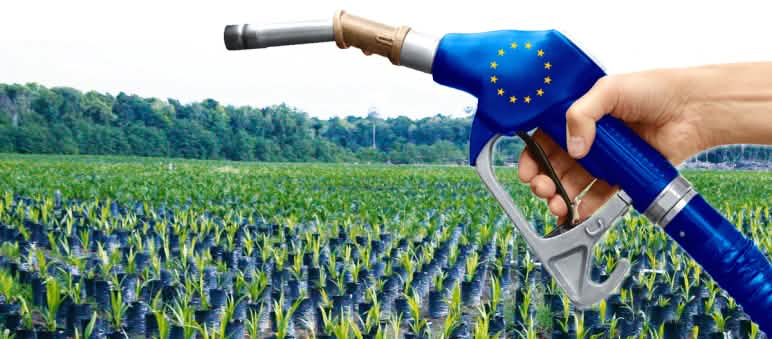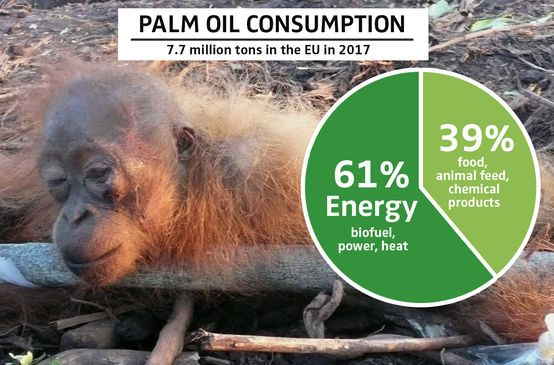
Baby steps toward banning palm oil biofuel in the EU
: Palm oil-based biofuel is anything but “green”, yet around four million tons of the tropical oil are added to diesel fuel every year. The European Commission has now adopted legislation that will phase out the admixture of palm oil by the year 2030.
On 13 March 2019, the European Commission presented a long-awaited piece of legislation that classifies the admixture of palm oil to diesel as NOT sustainable. Palm oil will thus no longer to be promoted in the transportation sector via the EU’s Renewable Energy Directive.
With seven million tons annually, the EU is the world’s second largest importer of palm oil. More than half of that oil goes into the production of biodiesel and hydrotreated vegetable oil (HVO).
The cultivation of oil palms is one of the leading causes of deforestation and destruction of biodiversity, especially in Southeast Asia, but also in Africa and Latin America. Huge amounts of carbon are released in the process, which completely defeats the purpose of the EU’s biofuel policy. In addition, the palm oil industry remains guilty of grave human rights violations by driving indigenous people from their land.
According to the decision of the European Commission, the use of palm oil in diesel fuel will be gradually reduced as of 2023 and ended by 2030. We consider this timetable to be far too slow and incomplete: while this is a step in the right direction, faster progress is crucial to the preservation of tropical forests. Without immediate action, many of the remaining rainforests will be clear-cut in the next twelve years and their unparalleled biodiversity replaced by green deserts of uniform oil palm plantations.
The EU and its member states must not shirk their responsibilities. We also urgently need to ban the use of soybean oil in biofuels – a move that the European Commission overlooked. In South America, soy cultivation is one of the main drivers of the destruction of Amazon rainforests and the Cerrado savanna.
The next move will be up to the member states – they have the option to stop adding palm and soybean oil to biofuels well before the deadline. France is leading the way here: already in December 2018, the French National Assembly decided to ban the use of palm oil in biofuel by 2020.
International environmental and human rights organizations from around the world had long been calling for such a move. In February, 70,000 public comments were submitted on the draft legislation published on the EU website.
The member states and the European Parliament now have two months in which to adopt or reject the legislation.

Stop rainforest destruction for biofuels!
The production of palm oil-based biofuels is destroying rainforests and the livelihoods of smallholders. NOW is the time to ban biofuels once and for all.

Biofuel
The use of bioethanol and biodiesel in motor vehicles is a misguided attempt to save the climate. The ugly reality is that "green" fuels are destroying rainforests, accelerating climate change and condemning millions to poverty and hunger.